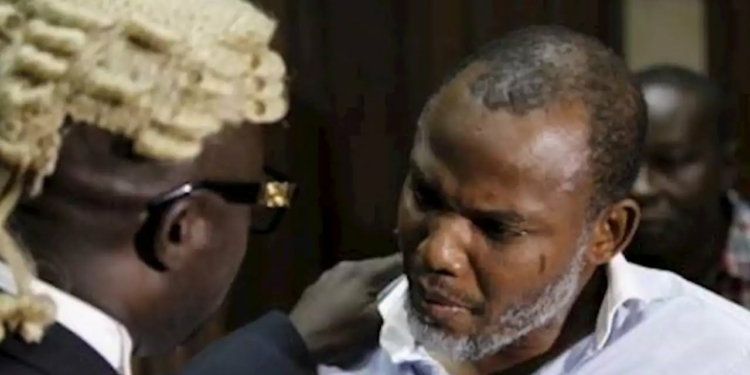- Kanu claimed he was subjected to different inhuman treatments
- Court ruled that Kanu’s suit lacked merit
A Federal High Court in Abuja has dismissed a fundamental rights enforcement suit filed by the leader of the proscribed Indigenous People of Biafra (IPOB), Nnamdi Kanu, accusing the Department of State Services (DSS) of rights violation.
In a judgment on Thursday, James Omotosho held that Kanu’s suit lacked merit because he failed to establish his claim that his rights were violated by the security agency.
The judgment was on the suit marked: FHC/ABJ/CS/482/2022 with the Director General of DSS, DSS and the Attorney-General of the Federation (AGF) listed as respondents.
Kanu, who is being held in the custody of the DSS, had claimed among others, that he was subjected to different inhuman treatments, including being denied his rights to wear any clothes of his choice like the Igbo traditional attire called “Isi-Agu,” while in their facility or any time he appeared in court for his trial.
He further claimed that while the DSS allows other detainees the freedom to choose and wear any clothes of their choice, he was restricted to wearing only a single pair of clothing.
In the judgment on Thursday, Justice Omotosho noted that the right to human dignity is enshrined in Section 34 of the Constitution, adding that it was clear that a right to human dignity is related to the right against torture, inhuman treatment, among others.
The judge was of the view that Kanu’s case did not relate to torture or forced labour because there was no evidence before the court that he was ever tortured while in custody.
Justice Omotosho held that the right to dignity did not include the right to change clothes as an inmate in a prison.
He added: “The applicant cannot come to court to seek rights which are not in the constitution.”
The judge noted that the applicant failed to provide the photographs and names of inmates, who were allowed to wear different attires while in custody.
Justice Omotosho held that the onus was on Kanu to prove his case, noting that he merely relied on bare facts without any evidence, describing the applicant’s claims as “a hypothesis without concrete evidence.”










Discussion about this post